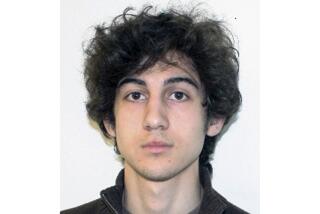Bryant Jurors’ Bias Becomes Issue
EAGLE, Colo. — Prosecutors in the Kobe Bryant sexual assault case Tuesday asked Judge Terry Ruckriegle for permission to remove prospective jurors who answered on a questionnaire that the Laker star was “probably not guilty” or “definitely not guilty.”
Bryant’s attorneys countered with a request that they be able to dismiss potential jurors who answered “probably guilty” or “definitely guilty” to the same question:
“Based on what you have read, seen or heard about this case, which of the following reflects your opinion of whether or not Kobe Bryant is guilty or not guilty of the sexual assault charges?”
Prospective jurors could check any of seven boxes: definitely guilty, probably guilty, possibly guilty, possibly not guilty, probably not guilty, definitely not guilty, not enough information to decide.
Ruckriegle did not issue an immediate ruling.
“The purpose of [the] question is to elicit prejudice or bias based upon what the juror has heard, seen or read from media or gained by other means,” Deputy Dist. Atty. Ingrid Bakke said, citing a state law that “essentially states that when a juror expresses bias, prejudice or enmity toward either party, they may be challenged.”
The request came when Ruckriegle was about halfway through interviewing 205 prospective jurors individually in closed court about what the judge had earlier ruled were topics too sensitive to discuss openly. All of the potential jurors -- plus 71 others who remain on call -- have filled out the lengthy questionnaire.
Legal analysts said the prosecution motion was an indication that a significant number of prospective jurors had strongly held beliefs about the highly publicized case that began when a 20-year-old Eagle woman accused Bryant, 26, of raping her at a mountain resort on June 30, 2003. Bryant has pleaded not guilty to a charge of felony sexual assault. If convicted, he faces four years to life in prison or 20 years to life on probation plus a fine of as much as $750,000.
“From the perspective of attorneys, anybody who answers definitively about guilt or innocence is somebody you have serious doubts about putting on the jury,” said Sarah Murray of Trial Behavior Consulting.
Prosecutor Bakke asked Ruckriegle during a short open hearing to grant prosecutors “challenge for cause” power to dismiss potential jurors who expressed a strong opinion favoring Bryant’s innocence on question No. 72 of the 82-question questionnaire.
Attorneys on each side are allowed to dismiss seven jurors without cause and may dismiss an unlimited number with cause.
“Judges normally want to reduce the number dismissed for cause and make the attorneys use their preemptive challenges,” Murray said. “It’s a way for the judge to make sure he has enough jurors.”
Murray, whose jury consulting firm has offices in Los Angeles and Denver, said courts had been split about whether expressing strong opinions about a case were grounds for dismissal with cause.
Ruckriegle appeared uncertain how to address the issue with potential jurors in public while balancing the rights of both parties to a fair trial. Asking prospective jurors to explain their answer to question No. 72 could “contaminate” the opinions of other potential jurors listening in the courtroom, he said.
News organizations are seeking access to the jury selection process, and Ruckriegle said there probably would be coverage of the opinionated prospective jurors’ answers.
Murray said potential jurors could not be as honest in a conversation with the judge as they were in filling out the questionnaire.
“Jurors know what’s socially appropriate to say,” she said. “Based on my experience, if the judge calls them in and specifically addressed question No. 72, those who answered definitively will start to wobble and not sound so definite.”
Although it is unclear how many prospective jurors hold strong opinions about Bryant’s guilt or innocence, the number is high enough to alarm prosecutors.
“I think everybody does know about the case,” said David Lugert, an Eagle lawyer who has followed the case. “They have ideas and preconceived notions.”
Jury selection continued after the hearing. The last 41 prospective jurors to be questioned in closed court will report today, then attorneys will reduce the total pool, and a second round of questioning is scheduled Thursday in open court.
Also Tuesday, attorneys representing the media asked Ruckriegle to make public numerous filings filed under seal in recent months. Attorney Chris Beall said the prosecution and defense had defied a February court order that limited the information that could be kept from the public. At a minimum, Beall said, the judge should release jury instructions and lists of the upcoming trial’s witnesses and exhibits.
More to Read
All things Lakers, all the time.
Get all the Lakers news you need in Dan Woike's weekly newsletter.
You may occasionally receive promotional content from the Los Angeles Times.









